How to Find Spyware on iPhone: Cybersecurity Tips
On the 11th of April, 2024, Apple warned its users in India and 91 other countries about a “mercenary spyware attack” that remotely attempted to compromise the iPhones’ security. When such spyware successfully infects your iPhone, your personal information like location, email, phone number, passwords, media, messages, and calls can easily leak into hackers’ hands.
Even though iPhones’ fame for bulletproof security seems to be in the past, it doesn’t mean you cannot protect your device. In this article, we’ll share with you how to find spyware on your iPhone and what you should do to get rid of it.

Signs of spyware on iPhone
First of all, you should be sure if your iPhone is really infected with spyware. How do you know your device has it? There are a number of telltale signs that your iPhone falls victim to a spyware attack:
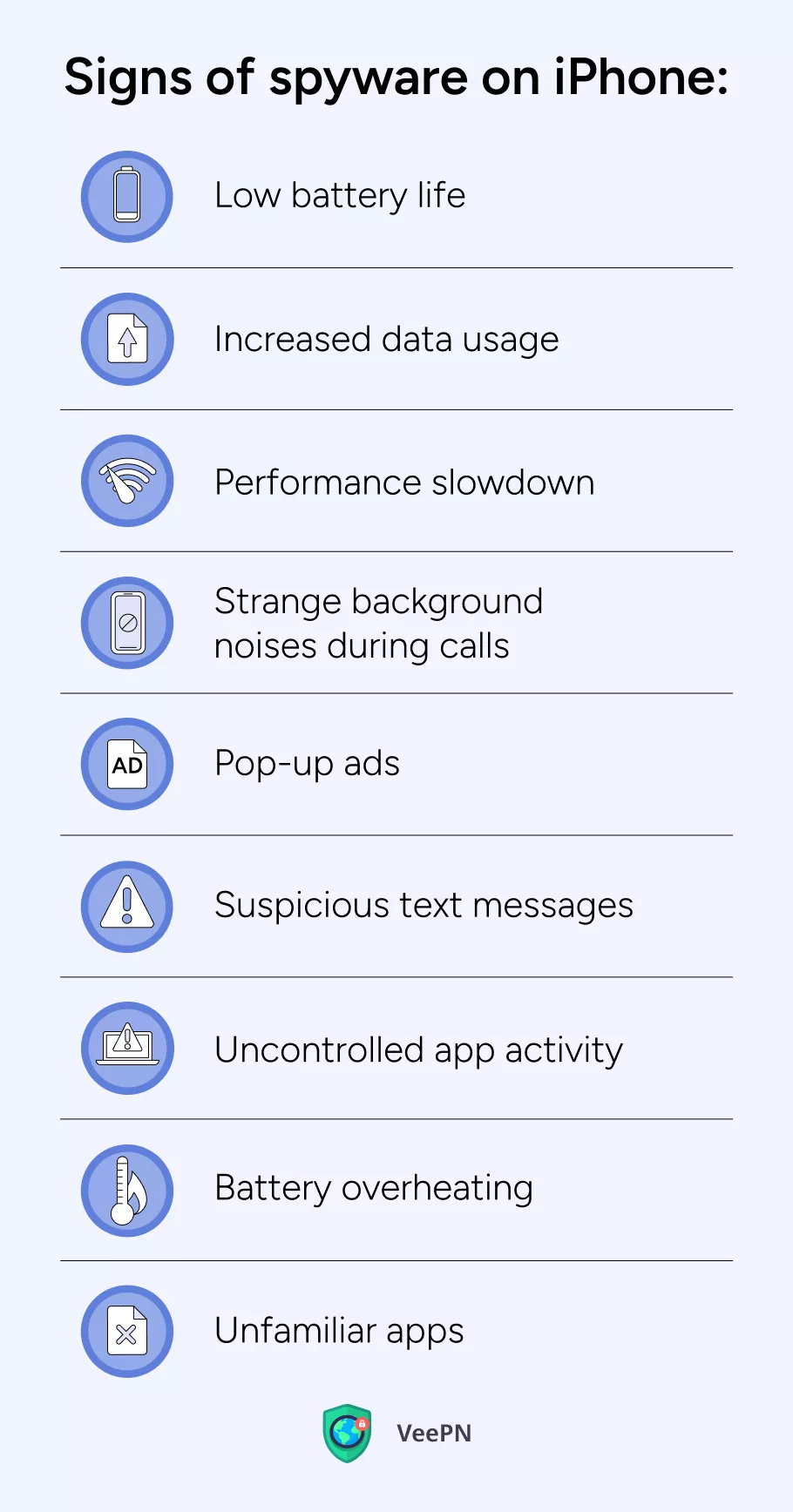
🆘Low battery life. If you notice that your iPhone’s battery gets low very fast while you just bought it, it is a reason to think that something is wrong with your security rather than the battery. Spyware can be one of the reasons, but you should remember that having just a battery depleted isn’t enough to think it’s spyware.
🆘Increased data usage. Spyware actively steals your data and sends it to hackers, which means your average Internet traffic spending can grow. Your bills for mobile Internet are likely to increase accordingly, so pay attention whether you start paying more while using the mobile Internet as usual. If you observe such a drastic increase, it’s a reason to think your iPhone is infected with spyware.
🆘Performance slowdown. Sluggish phone response, glitches, and app performance slowdown are the other signs of spyware on your iPhone. Again, these signs can be the evidence of other malware affecting your phone. Even if it’s not spyware, it’s a sound reason to be alarmed about the security of your iPhone and take immediate action to deal with the threat.
🆘Strange background noises during calls. Hearing strange noises during calls is definitely a bad sign which often signals about spyware on your iPhone. Pay attention whether you hear anything odd in the background of your calls, as it’s one of the most obvious spyware attributes.
🆘Pop-up ads. In case your browser becomes full of pop-ads and page redirects that take you to strange websites, it’s a red flag. It may not necessarily be spyware, but some sort of malicious app is definitely attacking your iPhone.
🆘Suspicious text messages. You may start getting strange text messages with phishing links, promos, advertising, and other spam. Even though it’s not a sure sign of spyware, it’s still a reason to take care of your iPhone’s security.
🆘Uncontrolled app activity. When your apps act as if someone else uses them, you can be sure it’s spyware that interferes with your iPhone’s normal life. It doesn’t necessarily mean someone remotely gains access to your device, but even sporadic activity of apps on your iPhone out of your control is a serious security threat.
🆘Battery overheating. iPhone battery tends to heat when you use resource-demanding apps or run games, but if your iPhone heats all of a sudden, it’s probably because spyware runs in the background and leaks your sensitive information.
🆘Unfamiliar apps. Spyware may install strange and unfamiliar apps on your iPhone to expand its presence and gain more control over your device. Unknown apps you’re sure you didn’t install are 1000% a reason to take action.
If you observe any of these signs on your iPhone, it’s highly likely that it has been infected with spyware. There are several ways how it managed to get into your device without you even suspecting it. Bear with us to know how this can happen.
How spyware gets on your iPhone
There are many ways how spyware can get into your iPhone. While you’re reading this article, it’s quite possible that one more way has been invented and is being actively used. Anyway, check out the common ways of how spyware can intrude in your iPhone:
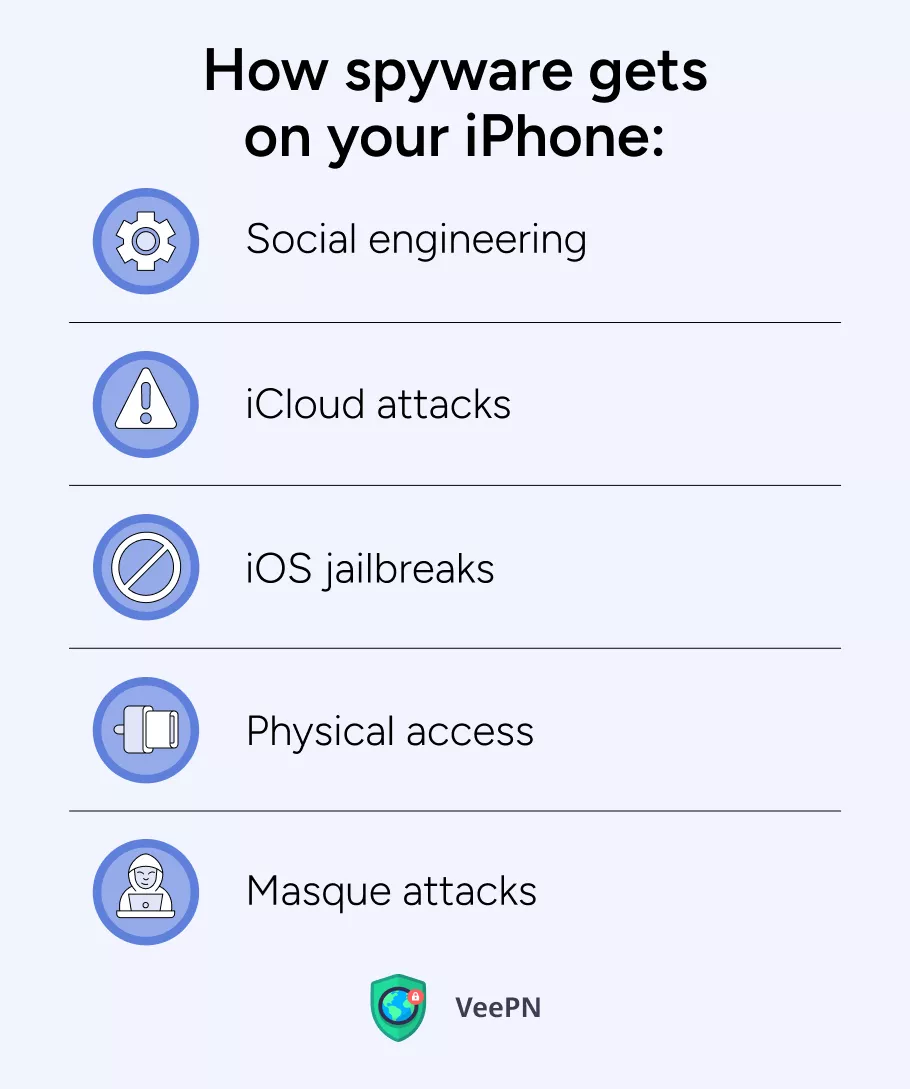
🥷Social engineering. One of the simplest ways to infect your iPhone with spyware is to hide it behind a phishing link that may look absolutely safe and legitimate. Phishing links usually lure you into clicking on them by promising a prize, discount, or requiring you to confirm your identity to access a particular service.
🥷iCloud attacks. Hackers may target your iCloud to steal its credentials and have a remote control over all of your linked devices. That’s why having a good password and changing it from time to time should be your habit just like doing your weekly laundry.
🥷iOS jailbreaks. This means you “hacked” iOS to install third-party apps that aren’t available in the AppStore. That’s a very risky move which we can’t recommend as you’ll seriously expose your privacy to a massive number of risks. If you’re going to buy a used iPhone, ask the seller whether it’s jailbroken and avoid such deals no matter how attractive the price may be.
🥷Physical access. You may connect your iPhone to a malicious computer via USB cable or pair it with accessories that have malicious firmware. Always make sure a third-party accessory is totally safe before connecting your phone to it.
🥷Masque attacks. Since spyware is a hidden app that infects your iPhone, it often hides behind apps and iOS updates. Such updates are usually available via third-party sources, so we don’t recommend updating your iPhone software anywhere else except for AppStore and regular iOS updates you get notifications from the system.
Can someone spy on your iPhone?
Unfortunately, yes, and it’s as creepy as it sounds. Spyware can sneak into your iPhone, letting hackers track your location, log your keystrokes (yep, even passwords & credit card numbers), and monitor your calls, texts, emails, and app activity. Basically, it turns your phone into a 24/7 surveillance device without you even knowing.
That’s why protecting your privacy isn’t optional. Know the signs, find the spyware, and shut it down before it’s too late.
Ways to detect spyware on iPhone
There are several ways you can identify spyware on your iPhone:
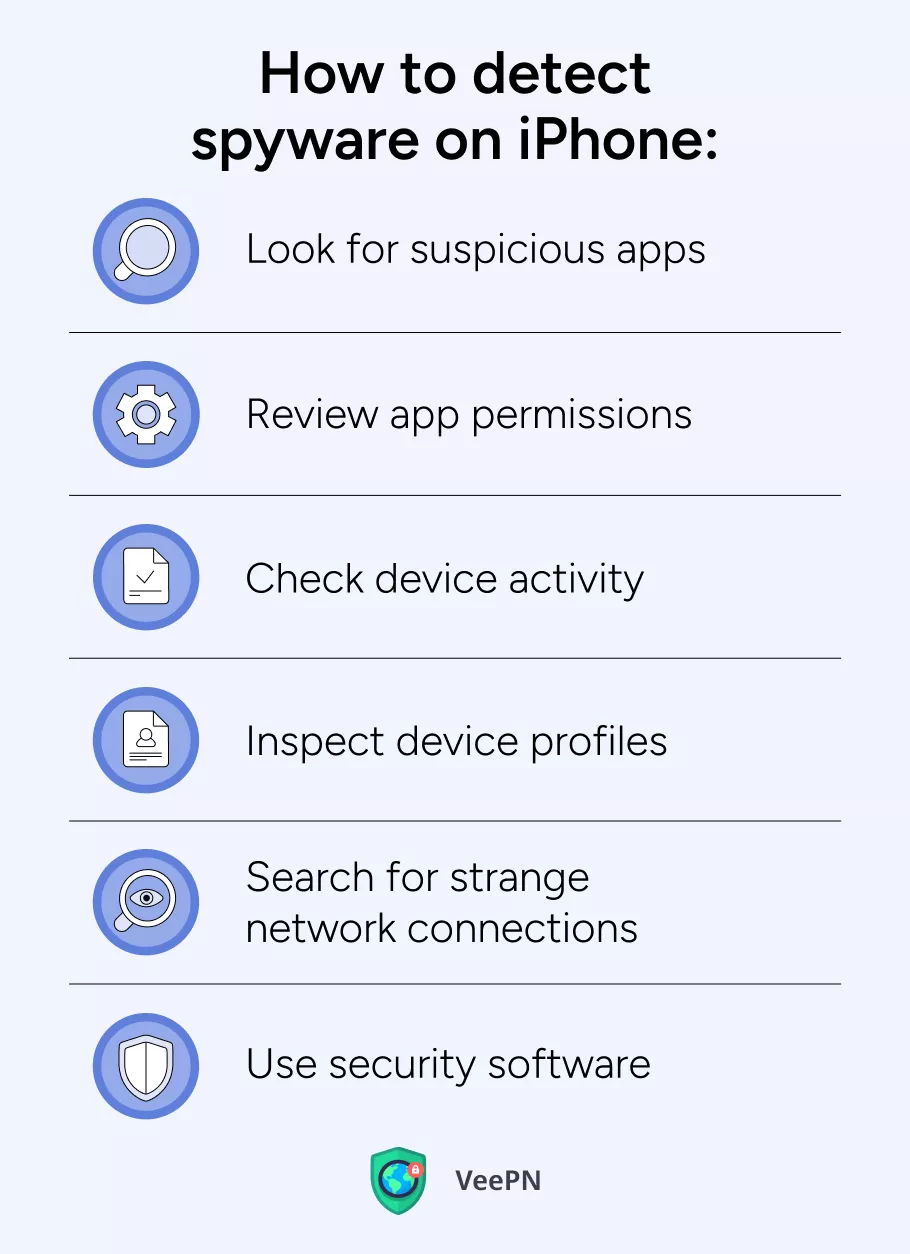
🔎Look for suspicious apps. Сheck whether your iPhone contains any strange apps you’ve never installed. If you have such applications, then your device is infected with spyware and you have to remove all these applications.
🔎Review app permissions. You may find that some apps have permissions to access your media library, contacts, banking credentials, and such despite the fact that you haven’t granted it and never would. For instance, a basic flashlight app doesn’t need access to your contacts or messages. Here’s how you can check app permissions:
1. Go to Settings > Privacy & Security.
2. Review the list for any unfamiliar apps.
3. Check the permissions granted to each app.4. You can also consider disabling Location Services if not needed.
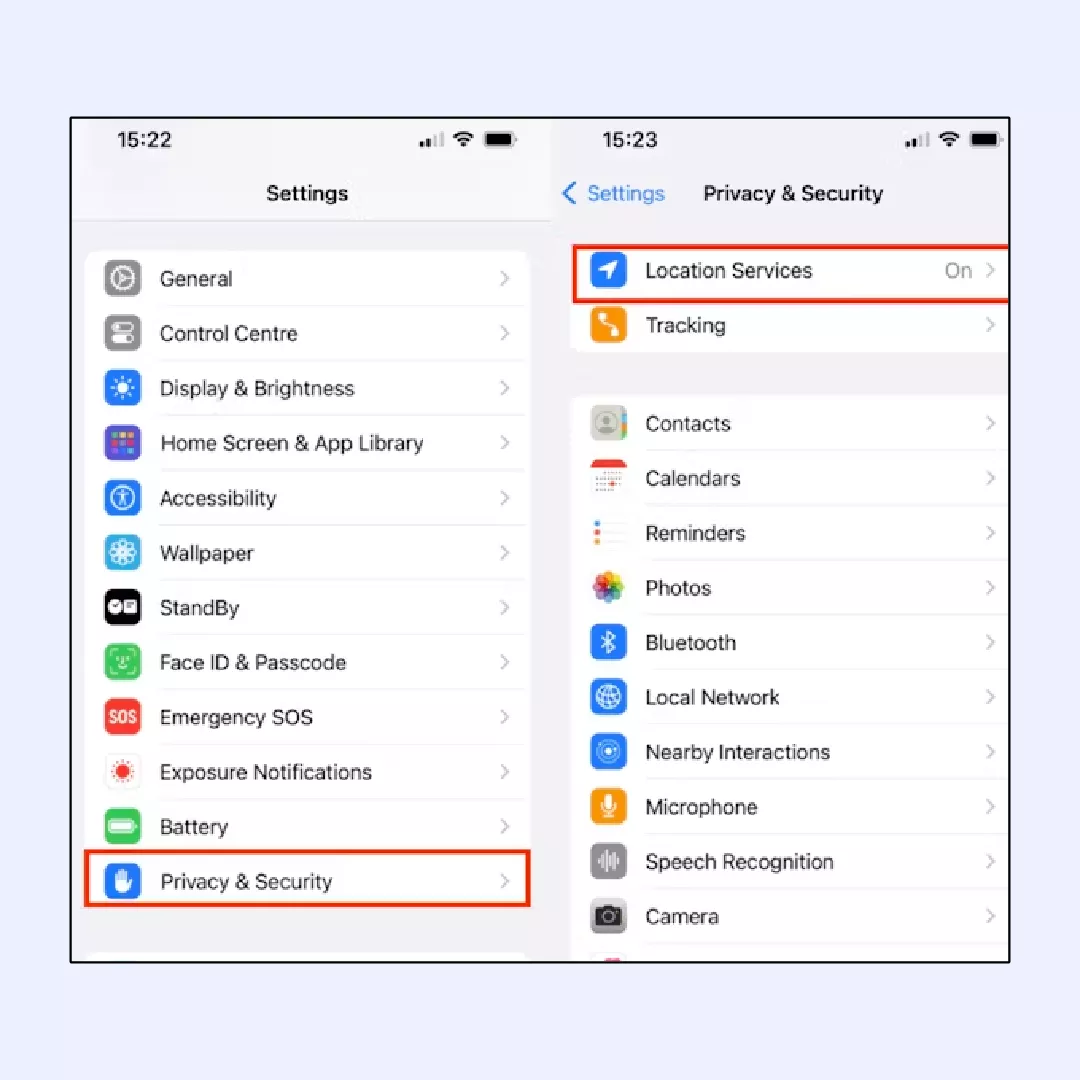
🔎Check device activity. If your battery’s draining way too fast, your data usage is through the roof, or your phone feels hotter than it should, it’s a red flag! Spyware loves running in the background, eating up resources. Check under Settings > Battery and Settings > Cellular to see what’s hogging your power.
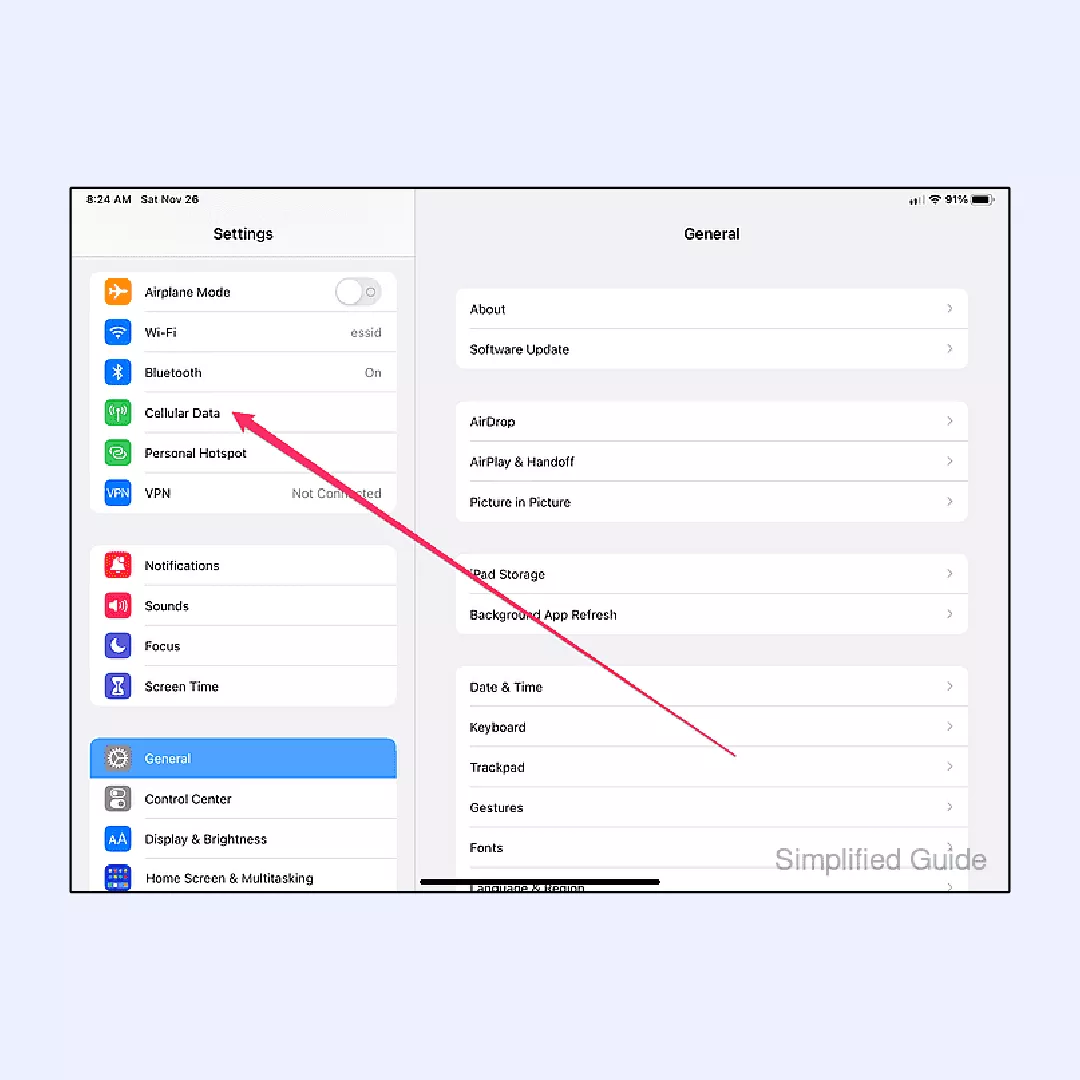
🔎Inspect device profiles. Some spyware installs hidden device profiles to control your phone without you even knowing. To check for spyware on iPhone, head to Settings > General > Profiles & Device Management (or VPN & Device Management on newer iPhones). See anything weird? DELETE. IT. NOW.

🔎Search for strange network connections. Spyware can force your phone to auto-connect to sketchy networks to keep stealing your data. Go to Settings > Wi-Fi, scan the list, and if you see a network you don’t recognize, tap the info icon and hit “Forget This Network” — immediately.
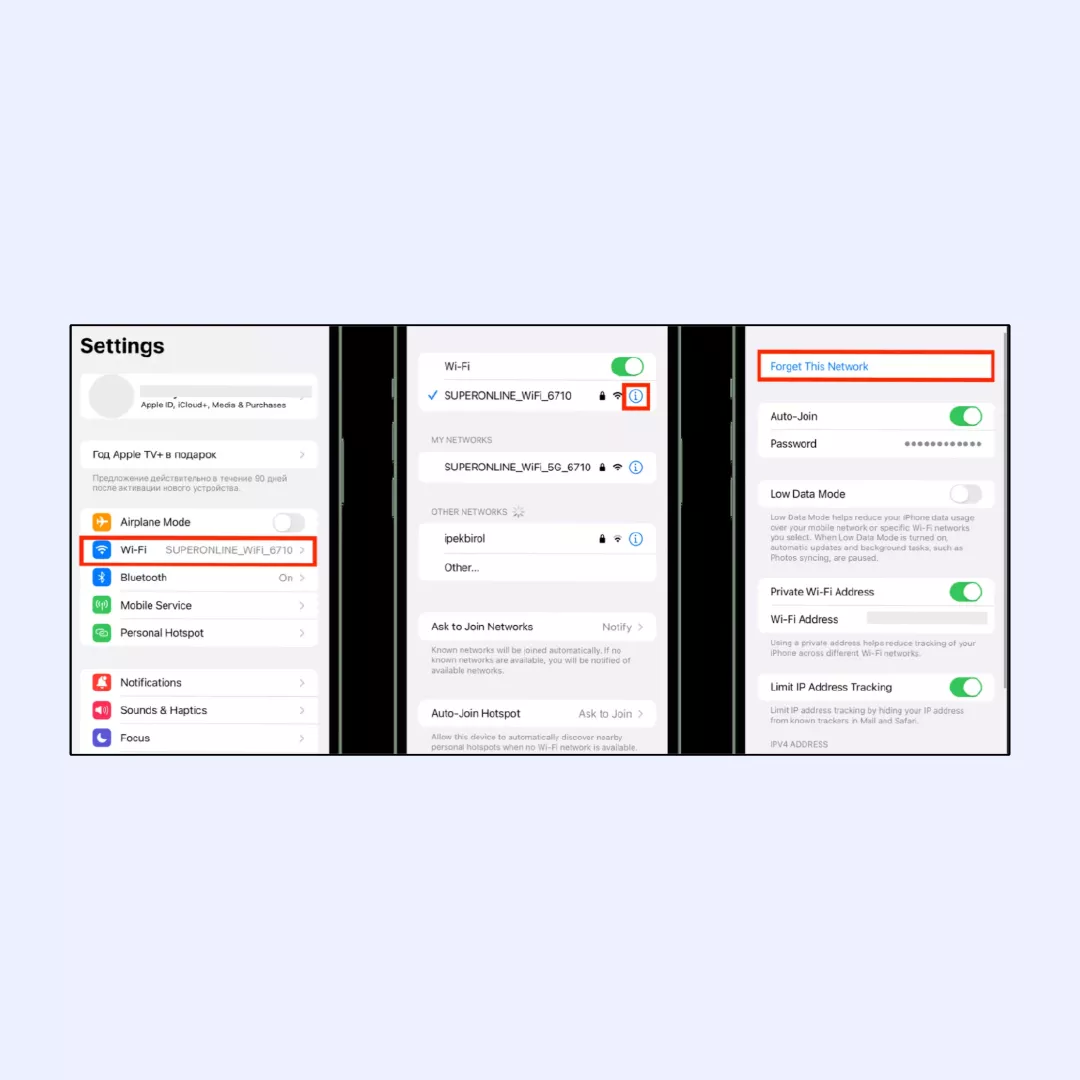
🔎Use security software. Install a security application such as antivirus software and run a deep scan to detect any malicious apps on your phone. That’s a simple yet reliable way to detect and delete spyware from your iPhone for sure.
Removing spyware from iPhone: basic tips
If you’re sure your iPhone is under attack of spyware, follow these simple tips to get rid of this malicious application once and for all:
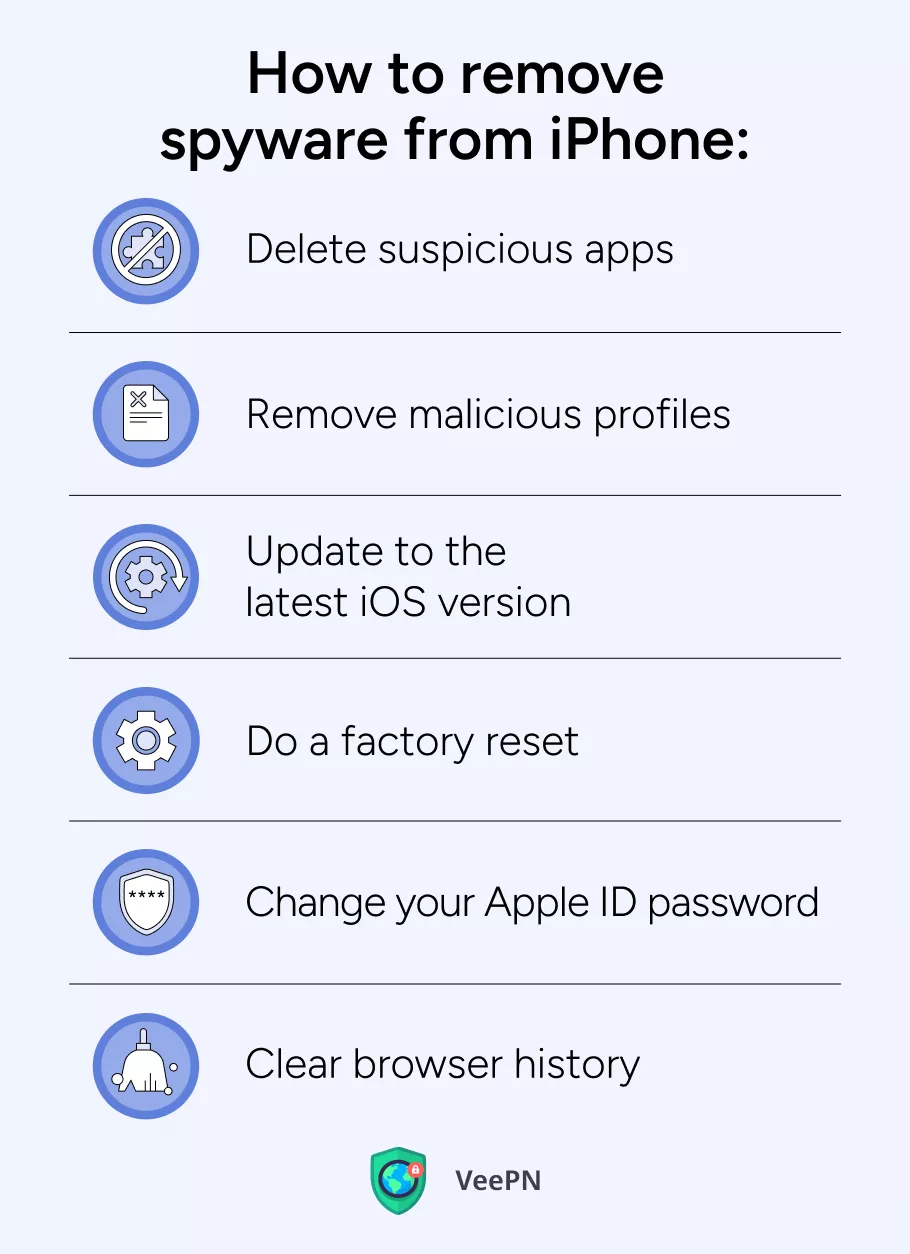
✅Delete suspicious apps. Remove all apps you don’t trust or don’t remember installing as they are likely to work on the side of spyware and its lousy owners. To delete a suspicious app on your iPhone, press and hold the app icon until options appear. Then, select Remove App (or Delete App, depending on your iOS version) and confirm by tapping Delete App.
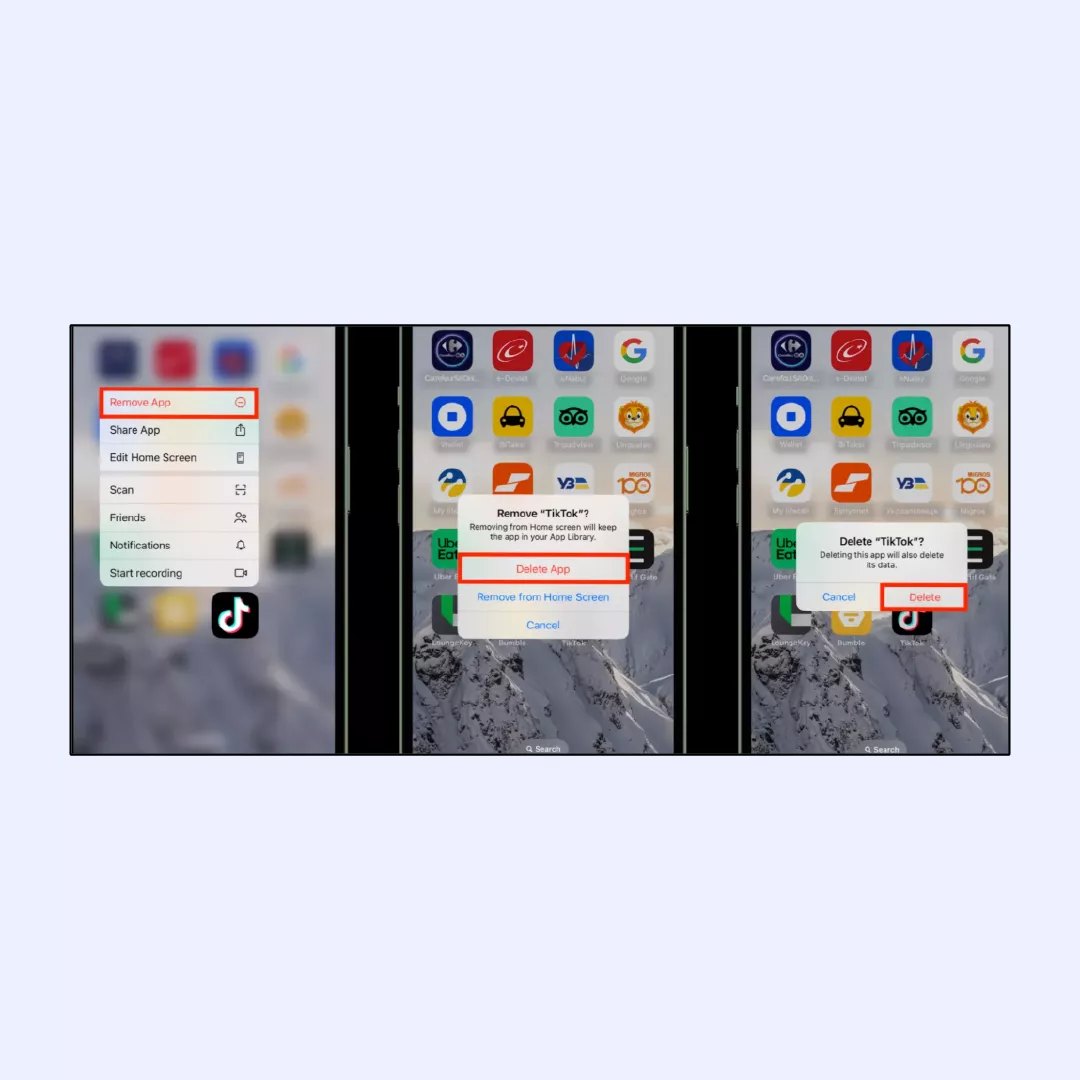
✅Remove malicious profiles. If you come across a suspicious profile while inspecting your device, delete it by navigating to Settings > General > Profiles & Device Management (or VPN & Device Management in newer iOS versions). Select the profile and tap Remove Profile to eliminate any potential threats.
✅Update to the latest iOS version. Apple frequently releases updates to fix security vulnerabilities and enhance your device’s protection. To ensure your iPhone is up to date, go to Settings > General > Software Update and check that you’re running the latest version of iOS.
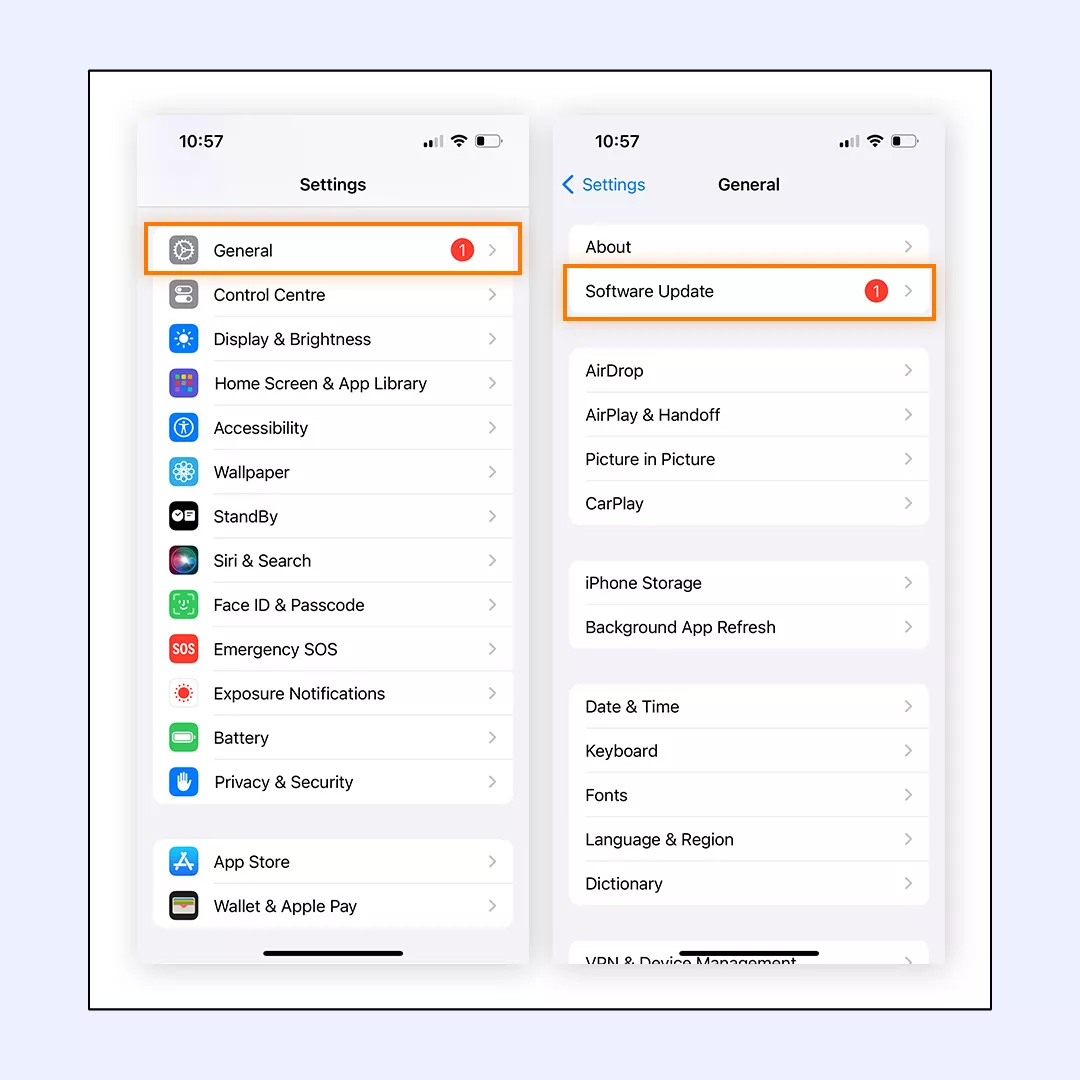
✅Do a factory reset. A factory reset will get your iPhone to the state it was when you bought it and launched for the first time. Remember that all files and other data will disappear, so make sure you’ve made a data backup. To factory reset your iPhone:
- Open Settings and tap General.
- Select Transfer or Reset iPhone.
Choose Erase All Content and Settings.

✅Change your Apple ID password. If you suspect spyware on your iOS device, it’s crucial to change your Apple ID password immediately. Here’s how to update your Apple ID password on your iPhone:
1. Go to Settings and tap your name at the top.
2. Tap Sign-In & Security.
3. Select Change Password.
4. If prompted, enter your device passcode.
5. Follow the on-screen instructions to set a new, strong, and unique password.
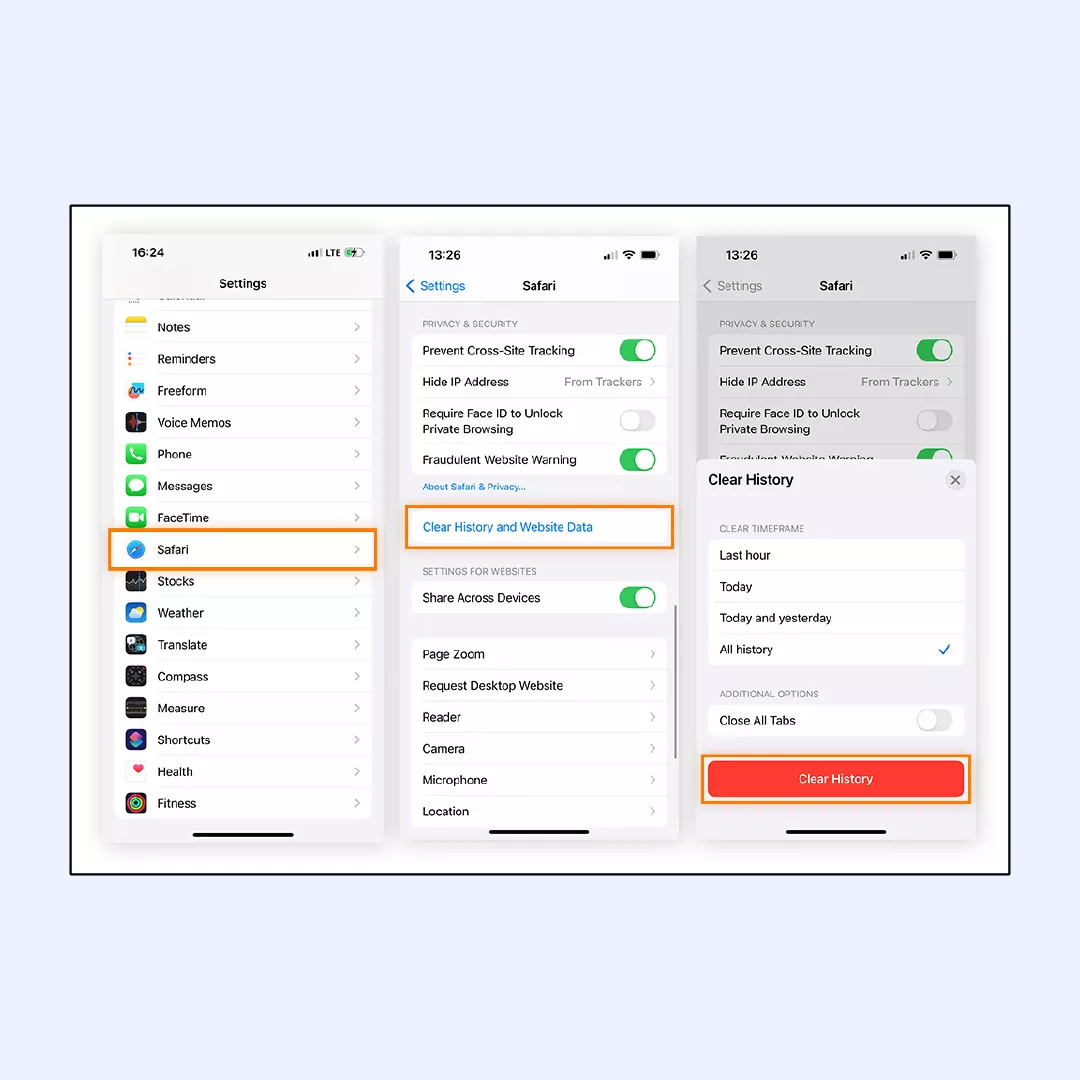
✅Clear browser history. Last but not least is to clear your browser history. Regardless of the browser you use on your iPhone, some spyware can hide within your browsing data and history. Additionally, your browsing history is logged and stored unless you’re using Incognito mode, making it accessible to malicious actors. To protect your data, it’s important to clear your browsing history and data regularly. Here’s how to clear browsing data and history from Safari on your iPhone:
- Open the Safari app, tap the book icon at the bottom, and select Clear to delete your browsing history and cookies.
- Choose the time period you want to clear.
Our recommendations for protecting your iPhone from spyware
Knowing how to find hidden spyware on iPhone is definitely a useful skill, but it’s much better to avoid getting these hidden apps on your device. Here are several important tips on how you can protect your iPhone from spyware:
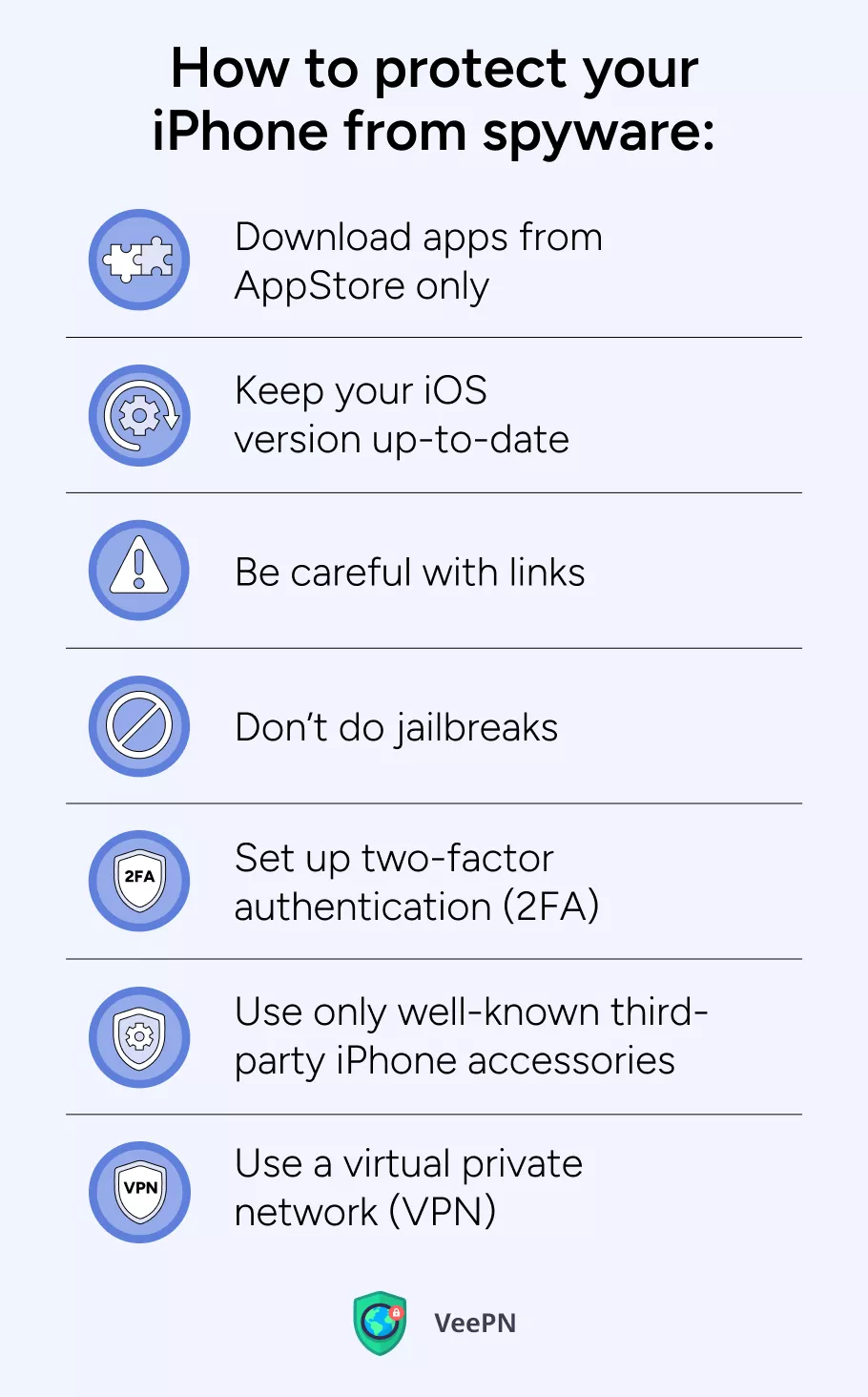
🛡️Download apps from AppStore only. Downloading apps from external sources beyond the AppStore necessarily means you expose your security to risks. At the same time, all applications available in your local AppStore have passed security checks and are safe to install.
🛡️Keep your iOS version up-to-date. The latest iOS version means that Apple took care of all loopholes and security gaps they’re aware of, so it’s the safest iOS version you can have for now. Otherwise, you risk exposing your iPhone to threats that use such security gaps, and spyware is no exception in this respect.
🛡️Be careful with links. Phishing attacks are a persistent cybersecurity problem you should always remember about, so pay attention to links you follow on your iPhone. Avoid strangely looking links or those that attempt to imitate legitimate URLs. For example, amaz0n.com instead of amazon.com is an attempt to spoof a real Amazon website.
🛡️Don’t do jailbreaks. Even though jailbreaks give you the opportunity to install apps from third-party sources, such risks aren’t worth it as you sacrifice your security. Jailbreaks totally “neutralize” security measures of your iPhone so it’s exposed to spyware apps that you’re likely to install together with third-party applications you jailbroken your iPhone for.
🛡️Set up two-factor authentication (2FA). Don’t rely on just email and password credentials. If an app supports a 2FA, use it as spoofing your Touch ID or Face ID is a task hackers are unlikely to succeed in.
🛡️Use only well-known third-party iPhone accessories. There are many third-party accessories for iPhones, but some of them may contain malicious firmware that will infect your device as soon as you pair it with a third-party headphones, charging station, or any other device. That is why we recommend you use only commonly popular iPhone accessories brands.
🛡️Use a virtual private network (VPN). Using a VPN app will safeguard your iPhone and your personal information as it will pass all your Internet traffic through a separate encrypted tunnel and remote server, which means nobody can track you, and spyware won’t be able to leak your personal information even if it manages to infect your phone. However, we advise you against using free VPNs as they lack modern encryption methods to secure your iPhone. Instead, consider trying VeePN — a premium VPN app for iOS that uses the most reliable encryption technology and includes such security features as Kill Switch and DoubleVPN.
Secure your iPhone with VeePN
Spyware is a tricky cyberthreat that seems to become extremely dangerous as never before. We believe that our recommendations can help you detect spyware on iPhone and what’s best, prevent it from getting onto your device. VeePN is the all-in-one security app that can help you ensure your iPhone is always safe. It offers a built-in adblocking tool that automatically prevents any malicious pop-up ads in your browser and Breach Alerts that will instantly notify you about leakage of your personal information.
Install VeePN today and enjoy a 30-day money-back guarantee on your iPhone and 9 other devices with one subscription.
FAQ
To detect spyware on an iPhone, look for unusual behavior like rapid battery drain, increased data usage, or apps you don’t recognize. Check for unknown configuration profiles under Settings > General > VPN & Device Management, as these can be used by spyware. Keeping your iPhone updated and using reputable security apps can help detect and prevent spyware. To learn more about how you can locate spyware on iPhone, read this article.
Spy apps on iPhones work by exploiting vulnerabilities, configuration profiles, or jailbroken devices to gain unauthorized access to data. These apps can monitor calls, messages, GPS location, browsing history, and more by running in the background, often without the user’s knowledge. On non-jailbroken devices, spy apps might use enterprise certificates or malicious profiles to bypass App Store restrictions and gain access to the device’s data. Regular updates, avoiding suspicious links or apps, and reviewing configuration profiles can help protect against these threats.
To remove spyware from an iPhone, start by updating your iOS to the latest version, as updates often include security patches. Next, go to Settings > General > VPN & Device Management and remove any unknown configuration profiles. If the issue persists, perform a factory reset by going to Settings > General > Reset > Erase All Content and Settings; make sure to back up your data first. Additionally, avoid restoring from potentially compromised backups and instead set up your device as new to ensure spyware is completely removed. Check this article to get more information about how you can delete spyware from your iPhone.
VeePN is freedom
Download VeePN Client for All Platforms
Enjoy a smooth VPN experience anywhere, anytime. No matter the device you have — phone or laptop, tablet or router — VeePN’s next-gen data protection and ultra-fast speeds will cover all of them.
Download for PC Download for Mac IOS and Android App
IOS and Android App
Want secure browsing while reading this?
See the difference for yourself - Try VeePN PRO for 3-days for $1, no risk, no pressure.
Start My $1 TrialThen VeePN PRO 1-year plan






